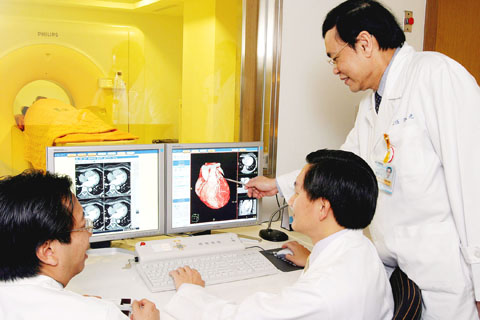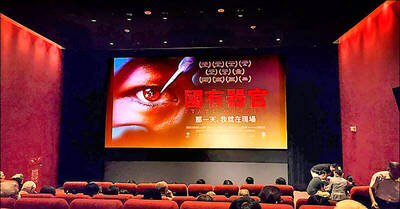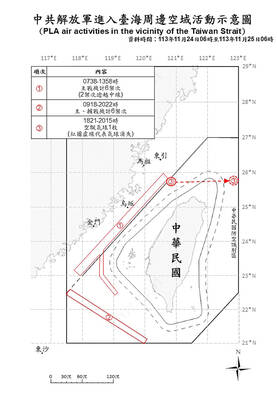Shen Jia, a property development executive from Shanghai, impulsively added a physical checkup to his itinerary while on a business trip to Taiwan early last month.
Shen is no stranger to routine annual health exams in China, and he said his first experience with healthcare on this side of the Taiwan Strait was impressive, especially what he called the “humanized” and “civilized” service.
His checkup at Shin Kong Wu Ho-su Memorial Hospital in suburban Taipei included a cancer-screening test that used a positron emission tomography (PET) scanner.

PHOTO: CNA
Since the hospital introduced Asia’s first PET scanner in 2001, the device has been so widely used in physical checks in Taiwan that it has almost become the standard in major medical institutions around the country. There are now more than 20 in use nationwide.
“There are not that many PET scanners in China and only two in Shanghai,” Shen said.
Shen’s observations were not confined to the casual visitor. The British research and advisory firm Economist Intelligence Unit in 2000 ranked Taiwan’s healthcare system the second best in the world after Sweden.
As its reputation grows, Taiwan is trying to take advantage of its cutting-edge medical resources to reach out to international medical travelers, in an attempt to break into a growing business that is estimated at US$30 billion a year globally.
The healthcare industry is advertising Taiwan’s congenial hospital environment and is promoting high-end physical checkups as one of the country’s pioneering products. Affluent travelers like Shen are an obvious target group.
In light of its geographical and cultural proximity to Taiwan, the China market is a primary target.
The potential for medical business from China has grown since July, following Taiwan’s move to admit larger numbers of Chinese tourists and the launch of weekend cross-strait charter flights.
FREE TIME
More significantly, Chinese tourists will soon be allowed to engage in individual activities for a day and a half while on group sightseeing tours.
“This regulation will be a major breakthrough, as Chinese tourists, under current regulations, cannot have medical checks in Taiwan,” said Walter Yeh (葉明水), executive vice president of the Taiwan External Trade Development Council (TAITRA).
Tourism Bureau statistics show that from July 18, when Taiwan officially opened its doors to larger numbers of Chinese tourists, to Aug. 26, a total of 10,228 Chinese tourists entered the country, with daily arrivals averaging 244. That number is expected to rise significantly if China eases its controls on outbound travel in the wake of the Beijing Olympics.
TAITRA estimates that if 10 percent of these visitors spent NT$20,000 on physical examinations in Taiwan, this would generate revenues of NT$6 billion (US$188 million) a year.
In June, Yeh led a delegation of representatives from 12 Taiwanese hospitals on a medical tourism fact-finding tour to Shanghai, Quanzhou and Xiamen.
A survey conducted by Taipei Veterans General Hospital of Chinese industry players during the tour found the outlook encouraging.
The hospital — the only public one represented on the trip — said that 90 percent of the respondents were interested in visiting Taiwan for pleasure, while 50 percent were willing to travel to Taiwan for medical care.
It said that most respondents had formed a good impression of Taiwan’s healthcare service through information channels such as the media and the Internet.
The respondents said they thought Taiwan’s medical institutions had an edge in terms of facilities, technology and services. They said they were most interested in seeking healthcare in Taiwan in the areas of physicals, dentistry and cosmetic medicine.
Yeh said that Taiwan could use physical checks and cosmetic medicine to “build a brand” until its other specialized healthcare services become better known internationally.
“We have many excellent products, but we need to reach a wider group of people,” said Yeh, who will lead a larger delegation to Beijing and Guangzhou in November.
PACKAGES
Taiwanese hospitals are promoting packages that incorporate regional tourism and physical examinations. They are offering top-end, state-of-the-art routine services such as cardiac computed tomography (CT) scans, cerebral magnetic resonance imaging (MRI) scans and whole-body PET scans, with prices between NT$18,000 and NT$54,000.
Hung Tzu-jen (洪子仁), vice president of the Shin Kong Medical Club, said that only a limited number of the three types of devices used for these scans are available in China and they are employed mainly for diagnostic purposes.
“Unlike China, Taiwan is using the devices for routine health checks,” Hung said, adding he was confident Chinese business travelers would find the customized services highly attractive.
Another group of potential clients are owners and executives of Taiwanese businesses based in China. In March, Shin Kong Hospital served more than 100 business owners and executives who had returned from China for physicals, with each spending NT$35,000 on average, Hung said.
Focusing on this target group, TAITRA recently held a seminar for Taiwanese businesspeople based in China, encouraging them to add sightseeing and health examinations to their itineraries when they hold training programs in Taiwan for Chinese executives.
The ultimate goal in this field is to introduce to international medical tourists other high-end value-added medical services in which Taiwan excels, such as liver transplants, cardiac surgery, hip joint replacements, assisted reproduction and craniofacial surgery, Yeh said.
Each year, hundreds of thousands of foreign nationals travel to countries such as Singapore, Thailand, Malaysia and India for medical care. Taiwan, which provides high-quality medical care at competitive prices, has been a slow starter.
LIVER TRANSPLANTS
The Taiwan Non-governmental Hospitals and Clinics Association, which has been contracted by the Department of Health to help promote medical tourism, said that liver transplant surgery costs half as much in Taiwan as in Singapore. It said that the survival rate in Taiwan for that procedure was the highest in the world, it said.
Also, the cost of coronary artery bypass surgery is 30 percent cheaper in Taiwan than in Singapore and 20 percent cheaper than in Thailand. Hip replacement surgery in Taiwan costs half of what it does in Singapore or Thailand, data provided by the association said.
With an eye on the revenue from medical tourism, Taiwan last May officially listed medical care as a category under which visitors could obtain visas.
Since then, 292 foreign nationals from countries other than China have been granted medical visas to visit Taiwan for cancer therapy and organ transplants. In this group, 164 were Filipinos, 59 Indonesians and 20 were from Malaysia and Vietnam, data from the Bureau of Consular Affairs showed.
In the 12 months to August, 20 Chinese citizens were also granted permission to visit Taiwan for medical care, the National Immigration Agency said.
The figures did not include visitors who traveled to Taiwan for physical examinations, cosmetic medicine or dental services — categories that do not require a medical visa.
Lee Wui-chiang (李偉強), director of the International Medical Service Center at Taipei Veterans General Hospital, agreed that complex specialized surgery was the area in which Taiwan is most competitive. The top priority of the nation’s medical institutions was to gain the trust of international medical tourists, a process that could take at least a couple of years, he said.
“It is not an easy decision to put one’s life in the hands of an overseas hospital,” he said.

Theaters and institutions in Taiwan have received 28 threatening e-mails, including bomb threats, since a documentary critical of China began being screened across the nation last month, the National Security Bureau said yesterday. The actions are part of China’s attempts to undermine Taiwan’s sovereignty, it said. State Organs (國有器官) documents allegations that Chinese government officials engage in organ harvesting and other illegal activities. From last month to Friday last week, 28 incidents have been reported of theaters or institutions receiving threats, including bomb and shooting threats, if they did not stop showing the documentary, the bureau said. Although the threats were not carried out,

HEALTHCARE: Following a 2022 Constitutional Court ruling, Taiwanese traveling overseas for six months would no longer be able to suspend their insurance Measures allowing people to suspend National Health Insurance (NHI) services if they plan to leave the country for six months would be abolished starting Dec. 23, NHIA Director-General Shih Chung-liang (石崇良) said yesterday. The decision followed the Constitutional Court’s ruling in 2022 that the regulation was unconstitutional and that it would invalidate the regulation automatically unless the NHIA amended it to conform with the Constitution. The agency would amend the regulations to remove the articles and sections that allow the suspension of NHI services, and also introduce provisional clauses for those who suspended their NHI services before Dec. 23, Shih said. According to

‘GRAY ZONE’ TACTICS: China continues to build up its military capacity while regularly deploying jets and warships around Taiwan, with the latest balloon spotted on Sunday The US is drawing up contingency plans for military deployments in Japan and the Philippines in case of a Taiwan emergency, Japan’s Kyodo news agency reported. They would be incorporated in a first joint operation plan to be formulated in December, Kyodo reported late on Sunday, citing sources familiar with Japan-US relations. A US Marine Corps regiment that possesses High Mobility Artillery Rocket Systems — a light multiple rocket launcher — would be deployed along the Nansei Island chain stretching from Kyushu to Yonaguni near Taiwan, Kyodo said. According to US military guidelines for dispatching marines in small formations to several locations,

As Taiwan celebrated its baseball team’s victory in the World Baseball Softball Confederation’s Premier12 on Sunday, how politicians referred to the team in their congratulatory messages reflected the nation’s political divide. Taiwan, competing under the name Chinese Taipei (中華台北隊), made history with its first-ever Premier12 championship after beating Japan 4-0 at the Tokyo Dome. Right after the game, President William Lai (賴清德) congratulated the team via a post on his Facebook page. Besides the players, Lai also lauded the team’s coaching and medical staff, and the fans cheering for them in Tokyo or watching the live broadcast, saying that “every